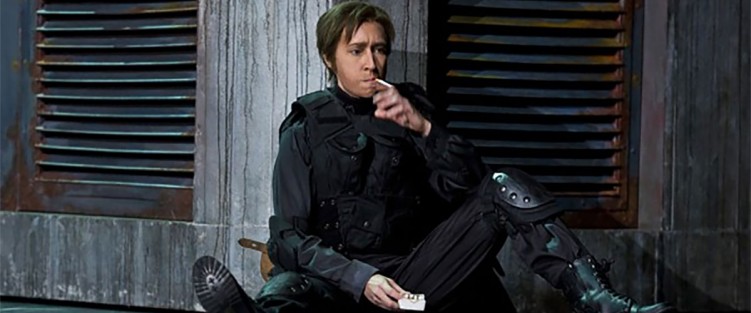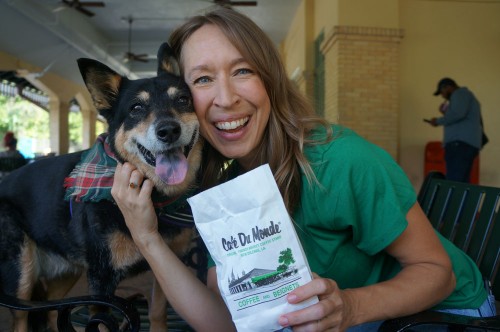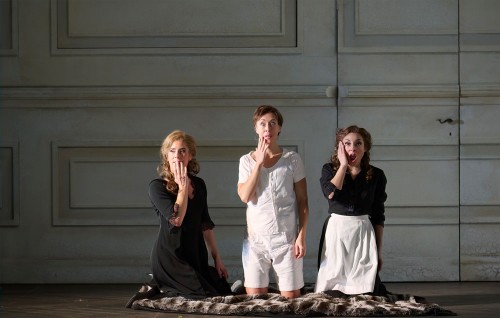Probably the most melancholy production of The Marriage of Figaro around, the Claus Guth-conceived Salzburg production first seen in Toronto in 2016, is back at the Canadian Opera Company for another run from January 27 - February 18, with a different set of principals, other than its Cherubino, Emily Fons, an American mezzo-soprano best known for Handel and Mozart trouser roles.
At a crossroads
When I reviewed the original, it was impossible not to highlight Fons’ athletic Cherubino as a case of perfect casting. Over coffee in a Queen East cafe earlier in January, she tells me that every mezzo excelling in boy and youth roles comes to a point when she needs to decide whether to graduate into singing the grown men of the repertoire (Giulio Cesare, Ariodante, Serse) or proceed to the other, more traditionally clad mezzo repertoire. What is needed for a successful career in trouser roles, I ask her. Voice type, physique?
“These days companies are casting more women who don’t have the body type you would expect in a trouser role,” she says. “I think it’s good to push the boundaries, but there’s always going to be those of us who walk into a rehearsal room and people go, You must be singing Cherubino. Definitely the colour of voice, the Fach, but also personality plays a big part. If you enjoy a certain type of role, you tend to do well in it, and people will cast you more in it.”
This is Fons’ seventh Cherubino; she has also sung Ariodante, Faramondo, Orlando, Hansel, l’Enfant, Prince Orlofsky, Nicklausse. But do North American opera houses generate enough opportunities, trousered and otherwise, for a mezzo-soprano operatic career? Or does every singer need to move to Berlin or Paris, and should they?
“I have a lot of thoughts on this,” she says. “When I first started, about 13 years ago, I told my manager that I wanted an American career. I had a family that I cared about, I had my dog that I love to have with me and that shouldn’t fly on the plane. People thought that was highly unusual – an American opera singer who wanted to stay in America. It wasn’t that I didn’t want jobs in Europe, it’s that I didn’t want to be away for six months at a time.” (For the current gig at the COC, she drove from home in Wisconsin with her dog, Lupita, in the back seat.)
The regional houses in America, she continues, have maybe three productions a year, and only two shows per each production. “That is a lot of work you have to string together to keep yourself afloat. And there’s a kinda push in America to consider opera companies as community service organizations, hiring an entirely different cast every season.” This is problematic.
“As an artist, you are hired for many different community building and music education programs – in cities far away from where you live. If you’re on the road all the time, what [community] are you serving? And a lot of artists want a life, a family, and not to travel 11 months of the year.”
What would work better both for the regional houses and the artists themselves, Fons argues, is the ensemble model: hiring a group of singers for a specific number of years and casting from that pool of talent for all productions. “If companies really want a community service model and are not saying that just to get the grant money, then the model to adopt would be to keep the performers in the city where they are from … People who attend opera would get to know you. It’s hard to make an impact if you fly in and out constantly.”
The high-risk soloist’s life
I ask her if she’s read the Alan Clayton interview in the Times of London in which he says that life of an opera singer is a life of loneliness in hotels, not being paid for rehearsals, and not getting a dime if you get sick and cancel. That interview re-started the conversation around the issue of singers not being paid for rehearsals. (Directors get part of their fee from day one of work, for instance.)
“I’m on the board of governors for the American Guild of Musical Artists, and we’re pushing for principal artists’ rehearsal time to be respected and paid. We still bear the most financial risk in this industry and it is not sustainable. Months ahead of rehearsal start time you’re looking for a place and booking and have airbnbs on your credit card. Then you arrive in a new city and start working and work for no money, and it’s only two months later that you get paid.”
Musicians in the pit are paid for every hour that they work in rehearsals, I remind her. “And in the States, not sure if it’s the same in Canada, choristers and dancers are paid either weekly or hourly,” she responds. “We shouldn’t make those working in principal roles risk so much. Coming out of the pandemic and seeing that there is still no willingness to change, that is pretty shocking but, at least in the States, we are making strides in getting companies to pay a percentage upfront.”
Is she still worried about COVID? “I think that the pandemic and the long shutdown of performing arts were tragic. For so many people. And the fact that even now people are having a hard time coming back out of the crisis and the never-going-out mindset.”
The latest reports out of the UK have it that ticket sales in a lot of artistic disciplines are not going back to the 2019 levels, I offer. Fons is not surprised, and wonders if it’s possible to reverse the trend. “I don’t know what the answer is … The bigger companies are gonna suffer the most because they have the biggest costs: huge theatres, office spaces, they’re often downtown and employ a lot of people. They’re probably the most affected and the least nimble.”
Looking after number one!
Meanwhile Fons has just completed a book specifically geared towards singers on how to manage money as a freelance artist (co-authored with finance educator Rebecca Eve Selkowe). “I wish this book existed when I was starting out,” she says. “As a young artist you sometimes watch some of your colleagues take off to superstar status and you watch the same people burn every penny they earn and complain constantly that they’re broke. Meanwhile there are people in the trenches piecing it together and making it work. And you think, how does this happen? I wanted the people who took off to be able to manage that and to benefit long term from that boom. Simultaneously, the people who are piecing it together, I wish that they can enjoy a safe financial life and not always feel on the brink of collapse.”
The book is written in two parallel tracks: the financial counsellor providing financial education; and the artist sharing her own experience. “One of the most challenging things for performers is we get these massive dumps of money on our accounts and I think it’s a confusing way to receive money. It leads you to sometimes spend the money in the way that you receive it. You get a chunk, you spend a chunk. Whereas people who are getting smaller amounts can’t really spend in large chunks. What we are saying is, you should spread your chunks into a nice layer.”
They are currently searching for a publisher, she says, but would be fine with doing a print-on-demand book which universities and Young Artist programs could supply to their singers. “When I was in my YA program in Chicago we were earning around $50,000 a year, which is pretty decent for a young singer, and you have health insurance! I would have approached it differently, had I had this book.”
Such as? “I would have paid off my student loans first. In YA programs you have the impression that you are still in school and that there’s no urgency to pay off the student debt yet. It was more fun to spend the money by, I don’t know, shopping at Whole Foods. “What we’re trying to impress on people with this book is that financial freedom is really artistic freedom, in a lot of ways. You give yourself more options when you set yourself up better financially.”
You can catch Fons’ Cherubino, seven years older and demonstrably wiser, at the Four Season’s Centre for the Arts until February 18, 2023.
Lydia Perović is a freelance writer in Toronto. This story is excerpted from a more wide-ranging conversation that appeared on Perovic’s blog “Long Play” in January.






